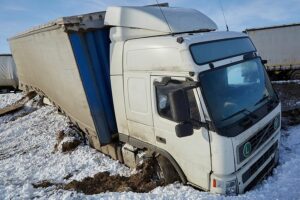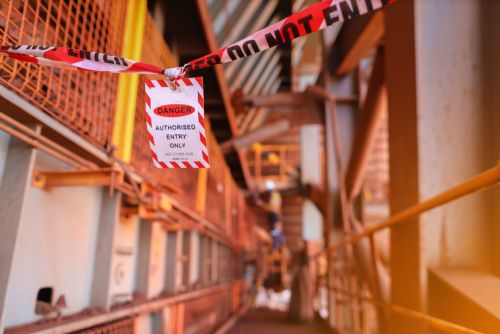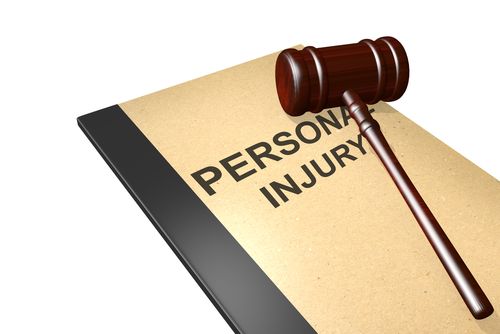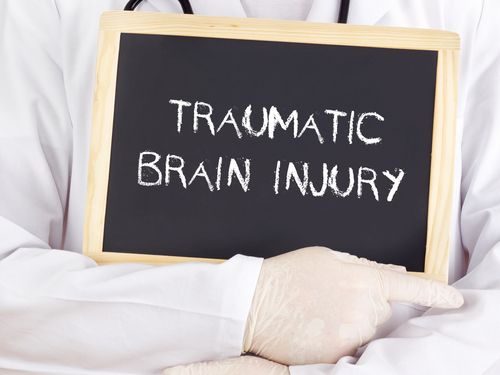
Truck accidents are not the same as accidents only involving passenger vehicles. The typical passenger vehicle weighs somewhere around 4,000 pounds. A fully loaded semi-truck and trailer can weigh more than 80,000 pounds. When these two vehicles collide, the smaller vehicle and its occupants may suffer terrible consequences.
For a free legal consultation, call 516-451-7900
Common Truck Accidents
Let’s look at the different kinds of truck accidents in detail.
- Jackknife Accidents – In a jackknife, the cab and trailer of a big rig fold at the coupling device. A passing car can collide with the moving trailer or drive under the truck’s rear. If the back part of the truck is moving fastest, it moves to a sharp angle, leaving the truck facing in two different directions. At this point, the driver loses control of the vehicle.
- Wide Turn – On occasion, a driver will steer or swing out to make a turn, a procedure known as a “wide turn.” If the driver is unaware of traffic to the rear or the side, this maneuver can trap vehicles or pedestrians.
- Underride Accidents – In an underride accident, a passenger car slides under the rear or the side of the truck. The height difference between the two vehicles means that the top or front of the car can be crushed or torn off, and the occupants can suffer severe or fatal injuries.
- Tire Blowout Accidents – We all see those parts of truck tires in pieces along the highways. Mostly, it’s just junk, but sometimes those tire pieces come from a blowout that resulted in a truck swerving into another vehicle, suffering a rollover, or jackknifing. Blowouts usually happen from wear and tear, defective tires, or poor maintenance. The truck can hit other vehicles when it rolls over or jackknifes, or the debris from the tire can damage other vehicles.
- Hazardous Materials Accidents – A lot of trucks carry many different hazardous materials. These “hazmats” can be gasoline, pesticides, explosives, or lithium batteries. What makes it hazardous in a highway context is whether the hazardous material in the truck is highly flammable, likely to explode, or will be harmful to breathe. Hazmat accidents don’t just hurt those in the vehicles. The explosions, fires, and chemical leaks can cause damage and injuries for miles around the accident.
- Unsecured Load Accidents – An unsecured load accident happens when the cargo in a truck is unstable for some reason. Usually, these accidents happen in one of two ways. First, if the truck is in an accident, badly secured cargo can fall or slide off the truck and into traffic or on the road, crushing those in the passenger vehicle or even pedestrians. Even if it doesn’t directly injure anyone, the debris on the road can cause additional accidents. Second, the instability of the badly loaded cargo can cause an accident by changing the truck’s center of gravity and causing unexpected and unpredictable movements.
- Blind Spots – There’s a reason you see trucks with “If you can’t see me, I can’t see you” on their mirrors. If a driver doesn’t see other vehicles when the driver is changing lanes, those unseen vehicles are at high risk of being hit, crushed, or forced off the road or into other traffic.
- T-Bone (Side Impact) Collision – When a truck hits a car perpendicularly to the car, it is usually quite bad for the car and especially for anyone on the passenger side of the car. There is little protection there, and the truck, likely running a red light, has a major size and weight advantage over the car.
- Head-On Collision – This is another accident where the mass and speed of the truck are very bad for the passenger vehicle. Head-on collisions are among the most dangerous crashes to start with; the size differential between a truck and car makes these particularly devastating for the passenger vehicle.
- Rear-End Collision – As with a head-on collision, the significantly higher weight and mass are highly destructive to the car ahead of it in a rear-end collision. The car hit may be crushed or pushed into other oncoming traffic.
Common Causes of Truck Accidents
Accidents can, of course, happen for any reason or, seemingly, for no reason.
There are, however, some typical causes of truck accidents.
Driver Fatigue – Federal and state regulations limit the consecutive and overall hours that a truck driver can drive in a specified period and also indicate how much rest and sleep there must be between shifts. However, many companies pressure their drivers to make better times by ignoring or bending those rules. The problem is that these drivers then fall asleep at the wheel or lose concentration and judgment while driving. Drivers who have gone without a day’s sleep function as if they had a blood alcohol content over the legal limit.
Distracted Driving – As we’ve turned our motor vehicle seats into little gaming parlors, we’ve begun to focus on anything but the huge lethal weapon that is a car or truck.
Distracted driving is the fastest-growing cause of accidents and results from:
- Texting
- Cell phone use
- Adjusting entertainment systems
- Eating
- Adjusting navigation systems
- Easting
- Talking to passengers
Drivers should focus on driving.
DUIs – Nearly one in three truck drivers uses speed on the job. That’s speed as in meth, not speed as in going too fast. Further, many drivers also use marijuana, and even a very few admit to using cocaine on the job. Coke and speed are tempting because they are uppers that make you feel like you can drive longer. On the other hand, they also make you feel invincible and aggressive, leading drivers to take unnecessary risks. Alcohol and marijuana, on the other hand, slow down reaction times and impair judgment. Being under the influence of any chemical substance can put a driver at a very high risk of an accident.
Speeding – Again, driver pressure to meet deadlines can make drivers feel forced to exceed the speed limits. However, the faster they go, the longer it takes for these vehicles to stop. If you’re a car in the truck’s path while physics says it can’t stop before it hits you, you’re in serious trouble.
Improper or Over Loading – The load in any truck has a significant effect on its center of gravity, thus affecting its ability to stay upright when the truck encounters potential rollover accident conditions. Further, in an open vehicle, a bad load can fall into traffic, crushing another vehicle or at the very least creating driving hazards with debris on the road.
Equipment Failure – Trucks require regular maintenance of many of their systems. Particularly dangerous accidents can occur when a truck’s brakes fail, and the driver cannot avoid hitting another vehicle or a stationary object.
Bad Weather & Bad Roads – Snow, rain, fog, and ice make driving more difficult. Each type of weather reduces visibility and makes stopping more difficult. Add poor road surface conditions to this mix, and an accident becomes almost inevitable.
Click to contact our personal injury lawyers today
What Injuries Result?
The injuries suffered in a collision with a truck don’t significantly differ from those in any other accident. The difference is that with the vast advantage that the truck has in size and weight, most of the injuries will affect those in the passenger vehicle, who will suffer more severely than those in a car-to-car collision.
Some of these injuries include:
- Head & Brain Injuries – These are among the most common injuries suffered in truck accidents. Occupants of the struck vehicle are tossed around inside it and possibly jammed or crushed by the impact of the truck. Skull fractures are not uncommon, and traumatic brain injuries (TBI) of greater or lesser severity are typical injuries. Even seemingly mild brain trauma can result in potentially fatal complications. The description of the injury as mild TBI relates only to the initial presentation of symptoms and not to the overall prognosis. TBIs that medical professionals initially deem mild can still cause serious, lasting effects and complications. If you are diagnosed with any TBI, watch for complications or lingering effects.
- Back & Neck Injuries – The most devastating back and neck injuries occur when damage to vertebrae causes damage to the spinal cord, the main element of the central nervous system. A tear in the spinal cord ends communication from the brain to the nerves and muscles below the injury. Temporary or permanent loss of sensation or paralysis from the point of injury down may result.
- Fractures – Fractures always require medical attention, and some fractures need emergency surgery. Bone breaks can cause permanent impairments or life-threatening infections if the bone pierces the skin. Broken ribs can cause damage to vital organs, and broken jaws or facial bones often require surgery and might cause disfigurement.
- Burns & Scarring – Explosions and fires following truck accidents can lead to severe burns. Burns require extensive treatment, and some victims develop life-threatening infections. Burn victims might need extended time in a burn center, and treatment can be painful. Even after weeks or months of treatment, many burn victims have permanent disfigurement that causes emotional suffering.
- Death – Death is a potential consequence of a truck accident. If a death results from the truck accident, the victim’s estate can seek all the damages the victim might have recovered in a personal injury suit, plus the long-term injuries suffered by the survivors.
Complete a Free Case Evaluation form now
What Damages Can I Get?
There are three kinds of damages available in a personal injury truck accident case – economic or special damages, non-economic or general damages, and punitive damages. Some states, such as New York, do not cap any of these damages; however, under the no-fault insurance law, non-economic damages are only available if the injured party can prove a serious injury.
Each type of damage reflects different kinds of compensation.
Economic or Special Damages – Economic damages, which you can generally demonstrate and prove with paid bills, invoices, and similar documents, include:
- Medical and hospital expenses
- Lost wages (present and future)
- Property damage to your vehicle
- Household services you needed because of the accident
- Rehabilitation
- Out-of-pocket expenses
- Lost earning capacity
Non-Economic or General Damages– Less easily ascertainable and more subjective than economic damages, non-economic damages include:
- Pain and suffering
- Bodily disfigurement
- The emotional impact of disability
- Mood disorders resulting from scarring or loss of motor and cognitive function
- Loss of companionship
- Loss of enjoyment of life
- Loss of sexual intimacy or function
Punitive Damages – Punitive damages do not compensate the victim, although the victim who successfully seeks them does receive the money. Instead, punitive damages punish the at-fault party and deter others from acting in the same manner. Punitive damages are difficult to get because the standard requires reckless indifference to the extent that virtually equals intentional misconduct.
How Can a Truck Accident Lawyer Help?
If you or a loved one suffered injuries in a truck accident, you have almost undoubtedly suffered severe injuries and aftermaths. Insurance companies recognize that you are vulnerable, with money going out in piles and dribbling in.
They will take advantage of your worry and anxiety by making the lowest possible offer they think they can get away with to settle your case. After all, insurance companies make money from receiving premiums, not from paying claims.
An experienced and knowledgeable truck accident attorney can take the burden of arguing with insurance company claims adjusters and attorneys off your shoulders. They know the strategies the companies use and, importantly, the appropriate counter-strategies.
Contact a truck accident attorney today for an initial consultation and case evaluation, usually at no cost. Let the attorneys be your advocate with the insurance company and handle the stress and strain of negotiating your case for the full compensation you need. The right law firm will protect your rights against trucking companies and insurers, fighting for the maximum settlement or award possible in your case.








